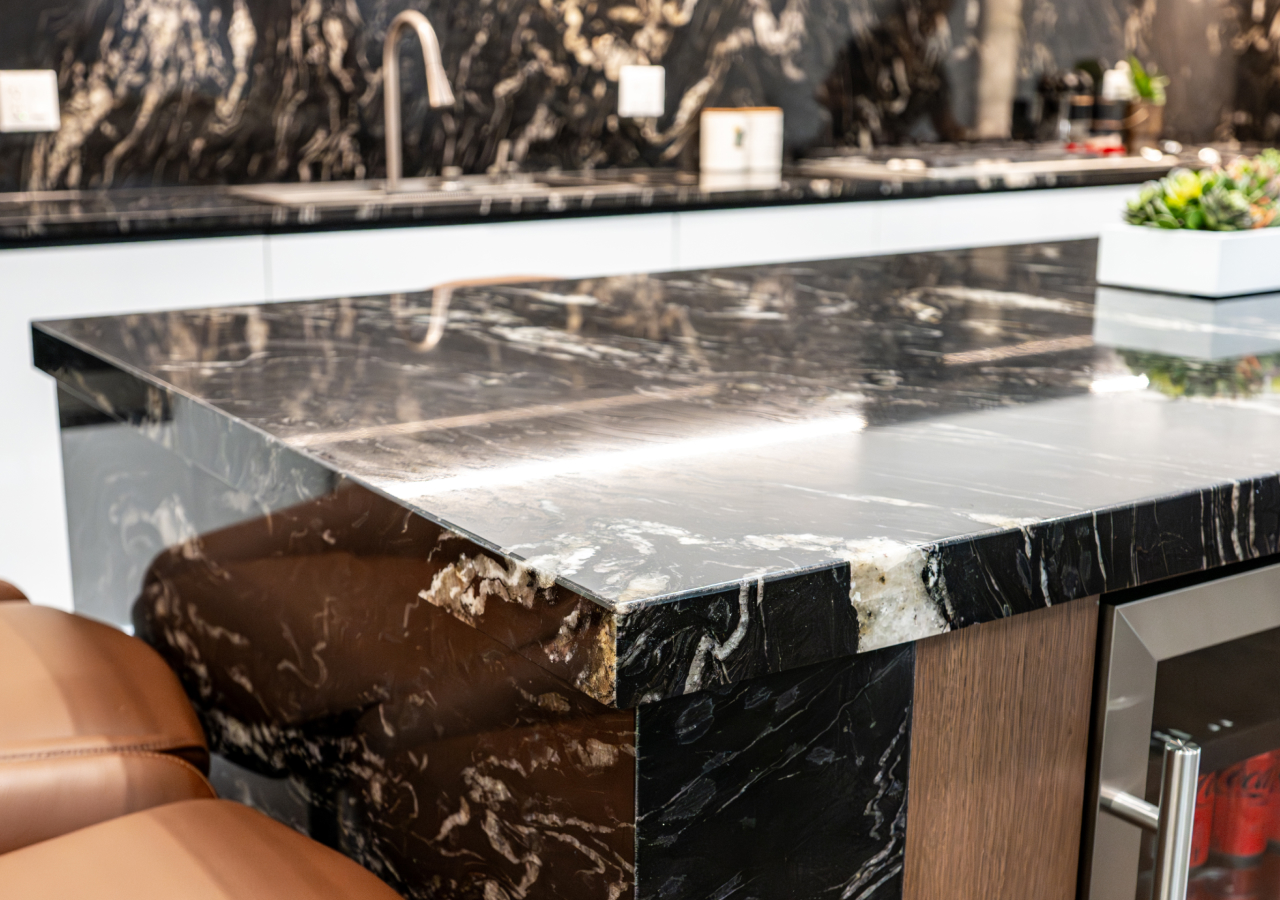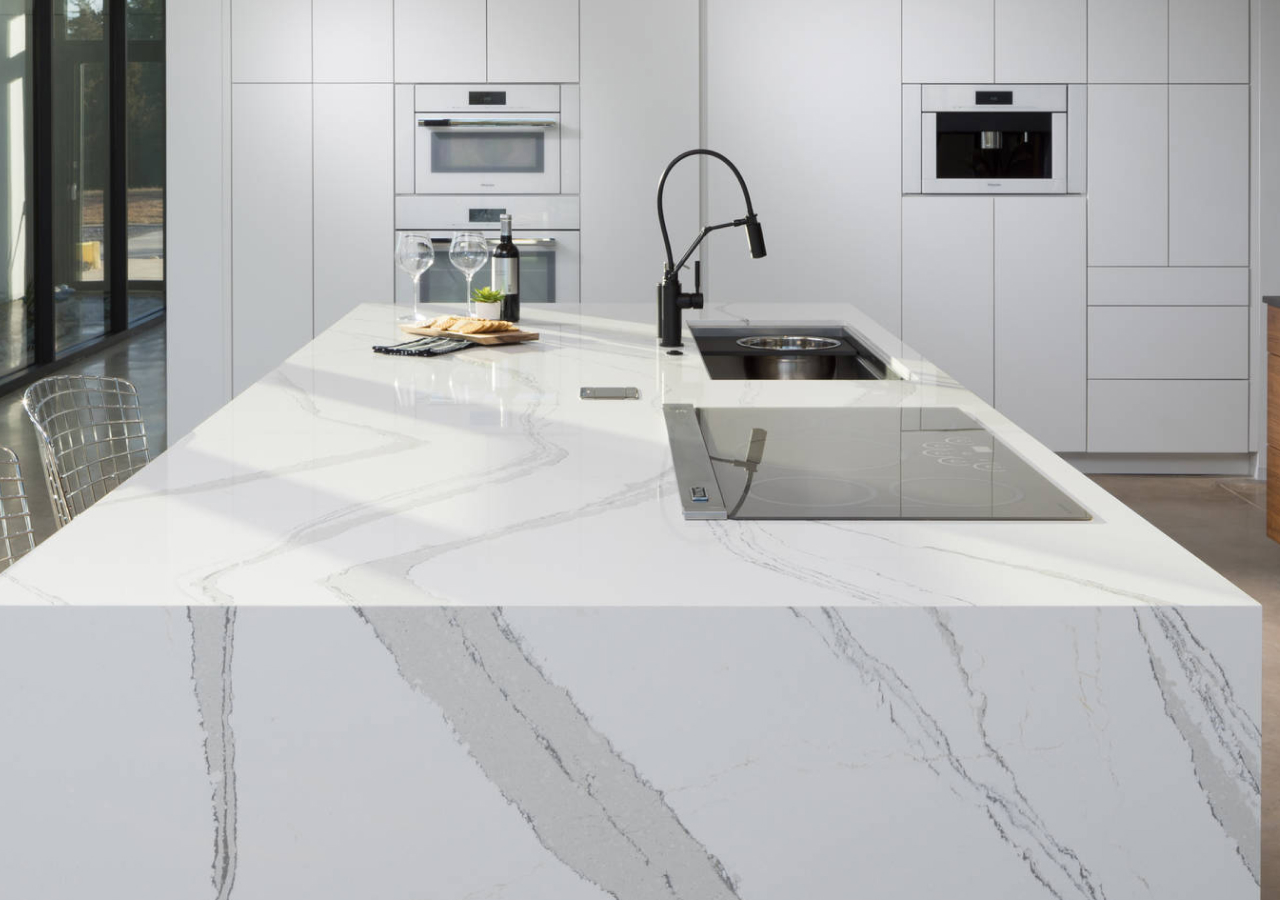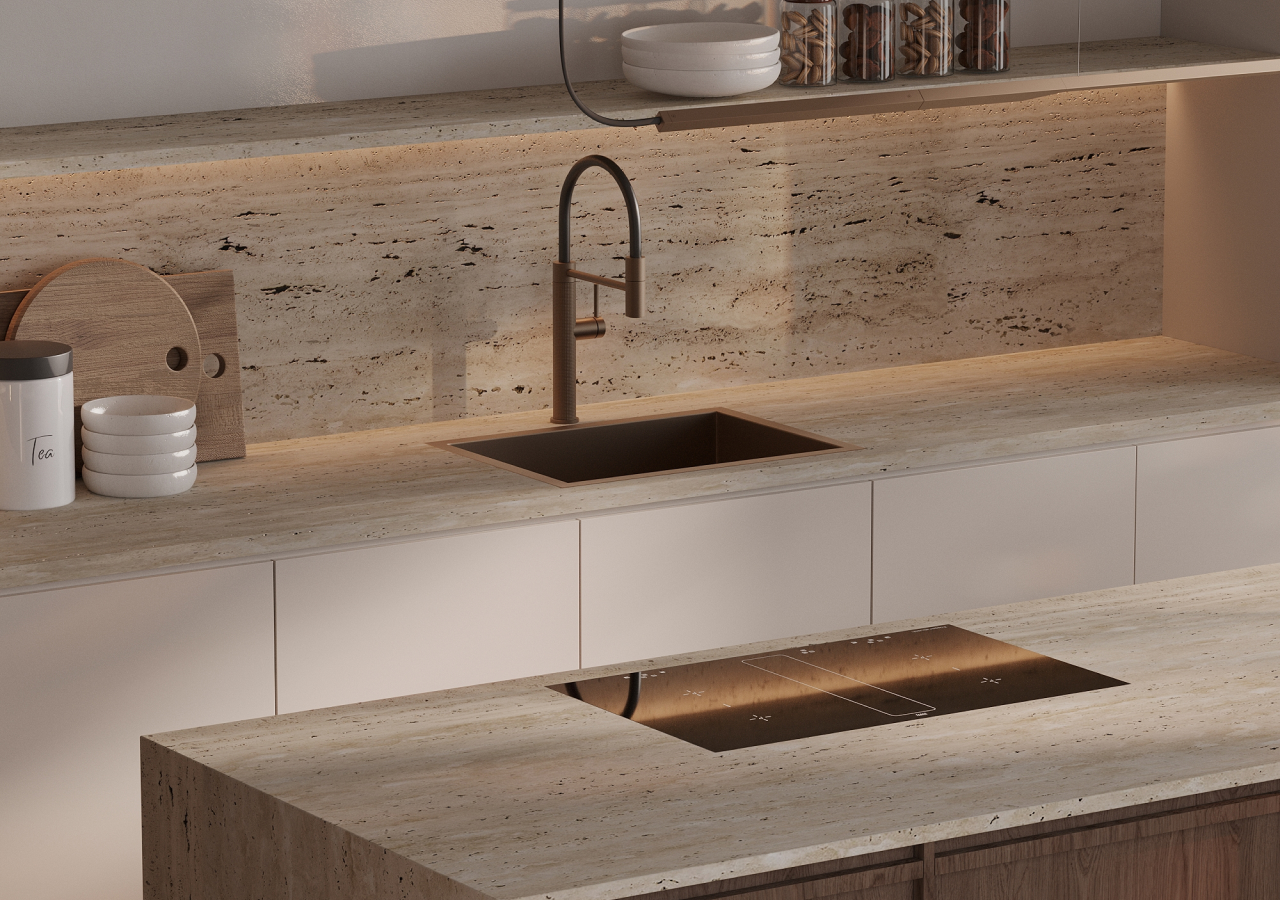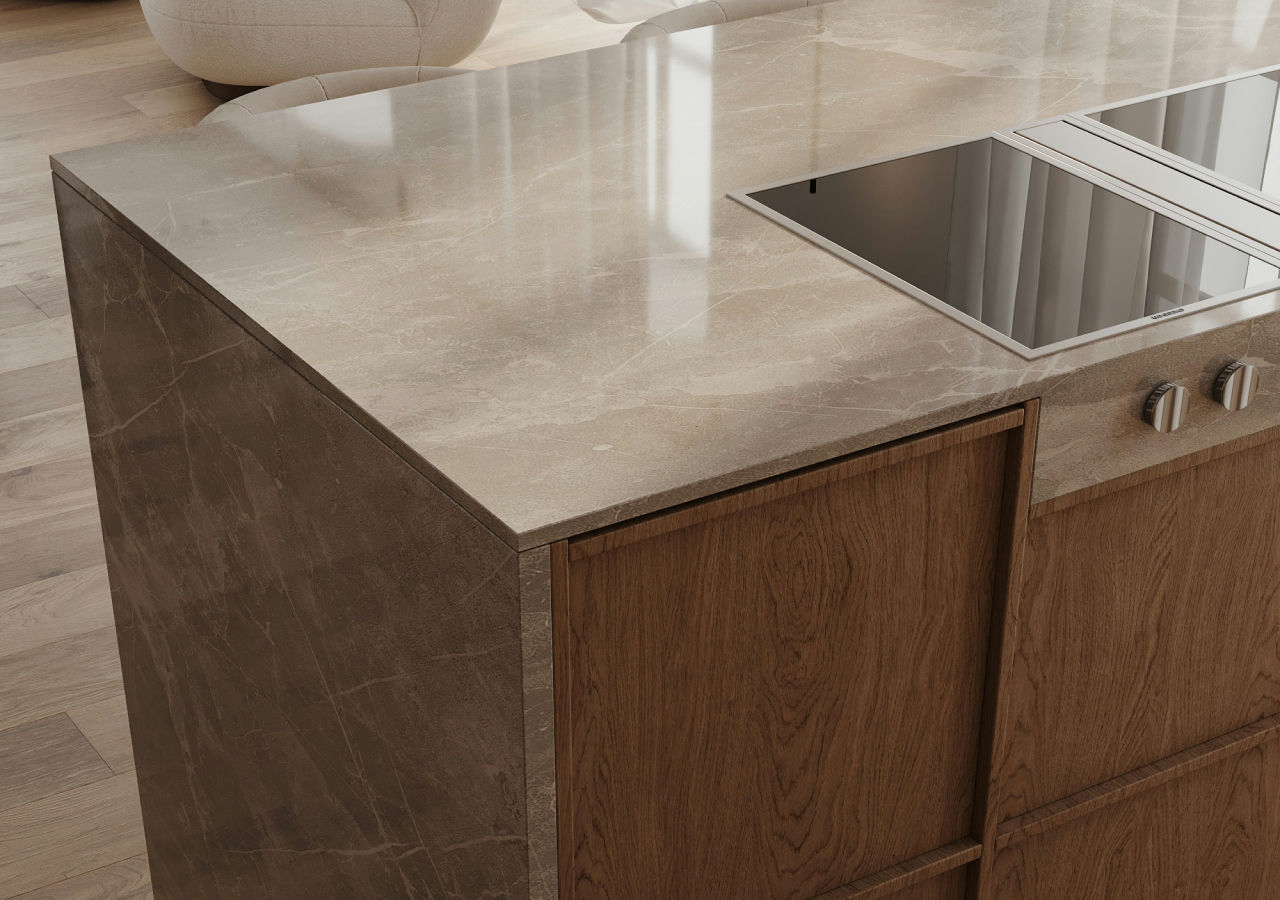Choosing a countertop is one of the most “daily-use” decisions in a kitchen. It affects how the space looks, how it feels to cook on, and how much time you spend thinking about stains, heat, and upkeep. Dekton vs natural stone countertops is really a choice between two design philosophies.
Natural stone brings one-of-a-kind movement, mineral depth, and a surface that can age into character. Dekton is a precision-made, ultra-compact surface built for consistency, durability, and low maintenance. Both can look stunning in modern kitchens. The right countertop material pick depends on your lifestyle, your tolerance for care, and whether you want your surface to stay visually “perfect” or evolve over time.
The Beauty of Innovation: Dekton Countertops
.webp)
Dekton is a sintered surface made by compressing a blend of minerals (often including quartz, porcelain, and glass) under extreme heat and pressure. The result is an ultra-compact slab that performs exceptionally well in busy kitchens.
Design-wise, Dekton is often chosen for clean, modern compositions: slim edges, crisp lines, and a cohesive look across countertops, islands, and backsplashes. In minimalist kitchens (think calm cabinetry, tight reveals, and simple forms), Dekton’s consistency helps the architecture feel intentional. It also comes in finishes that mimic marble, concrete, slate, and other natural looks, so you can get a stone-inspired aesthetic with less day-to-day worry.
Pros and Cons of Dekton Countertops

Dekton’s biggest advantage is how little attention it asks for. It is non-porous, so oils and liquids are far less likely to become “a thing.” It’s also highly resistant to everyday wear, which matters in real homes where cooking is frequent and countertops take a beating.
Where Dekton needs respect is at the edges and during installation. Impacts in vulnerable spots can cause damage, and fabrication quality matters. It also sits at the premium end of pricing, although many homeowners justify it because the surface stays stable and the upkeep is minimal.
Timeless Appeal: Natural Stone Countertops

Natural stone (granite, marble, quartzite, soapstone) remains the classic choice for homeowners who want authenticity and depth. Every slab is unique. Veining, mineral patterning, and subtle color shifts create a kind of visual texture that manufactured surfaces rarely replicate perfectly.
Stone also changes the feel of a kitchen. In Scandinavian-leaning spaces, it softens strict geometry and adds a grounded, tactile layer. In Japandi kitchens, stone can bring quiet contrast to warm wood and minimal lines, especially when the veining is low-contrast and the finish is honed or matte.
One of the defining traits of natural stone is how it ages. Some stones develop patina, soft wear, or tonal shifts that can feel rich and lived-in. If you love materials that gain character, stone is hard to beat.
Pros and Cons of Natural Stone Countertops

The upside is simple: uniqueness and natural beauty. Stone can also handle heat well, but performance depends on the specific material.
The tradeoff is care. Many stones need sealing, and some are more sensitive to staining or etching (especially marble around acids like lemon or vinegar). Cost also varies widely, from accessible granites to very expensive marbles and quartzites.
Dekton vs Natural Stone at a Glance
Function Meets Style: What Each Material Does Best

If your priority is a surface that stays consistent and easy in daily life, Dekton fits that brief. It supports modern kitchens where the design depends on clean lines, minimal visual noise, and a “reset fast” routine.
If your priority is warmth, movement, and a material that looks alive, natural stone delivers. It suits kitchens where texture matters and where you see the countertop as a feature, not just a work surface. In other words: Dekton tends to feel engineered and architectural. Stone tends to feel organic and expressive.
A Real-Life Decision Guide
.webp)
Here’s a practical way to decide, based on how people actually use kitchens:
Heavy home cook who hates maintenance
Dekton is usually the safer bet. It’s easier to live with, especially in lighter tones where staining anxiety can ruin the experience. If you want a best countertop for modern kitchens that stays predictable, this is often it.
Loves natural stone and patina
Choose stone, and choose intentionally. Quartzite is a common “performance-first stone” direction, while marble is the “soul-first” direction if you accept that etching can happen. If you love the idea that your kitchen evolves, stone will feel more rewarding.
Wants an ultra-slim, modern profile
Dekton is naturally strong in slim thicknesses, which helps achieve a sharp, contemporary edge. You can also get thin stone looks with mitered edges, but fabrication quality becomes even more important.
Wants the lowest risk of stains in light tones
Dekton is typically the lowest-maintenance route. Some quartzites perform well too, but it depends on the slab and sealing. If you want a calm, pale surface without a care routine, Dekton makes that easier.
What to Consider When Choosing a Kitchen Countertop

Maintenance
Dekton is close to “wipe and go.” Natural stone can be easy too, but many options need periodic sealing and more mindful cleaning. If you want minimal upkeep, Dekton leads. If you enjoy the authenticity and don’t mind a care rhythm, stone is worth it.
Aesthetics
Dekton offers controlled consistency and repeatable color. Stone offers individuality, depth, and movement. This is a taste decision as much as a performance decision.
Sustainability
Both can be responsible choices depending on sourcing and production. Natural stone is quarried and transported. Dekton uses mineral inputs and industrial manufacturing. In either case, ask about sourcing, fabrication practices, and longevity, since a long-lasting surface is often the most sustainable one.
Cost
Dekton typically prices like premium surfaces. Natural stone ranges from mid to very high depending on rarity. Think in terms of total ownership: sealing, potential repairs, and how satisfied you’ll feel living with the surface for years.
Conclusion
Dekton and natural stone can both be beautiful, durable choices, just with different personalities. Dekton brings stability, consistency, and low-maintenance confidence. Natural stone brings authenticity, texture, and a surface that can develop character over time. If you’re building a calm, design-forward kitchen and deciding between these two, choose the one that matches how you actually live.
If you want to see how each surface reads in real designs, explore our Japandi and Scandinavian collections, including kitchens where slim, modern surfaces and natural materials work together to keep the space calm and functional.

.webp)



